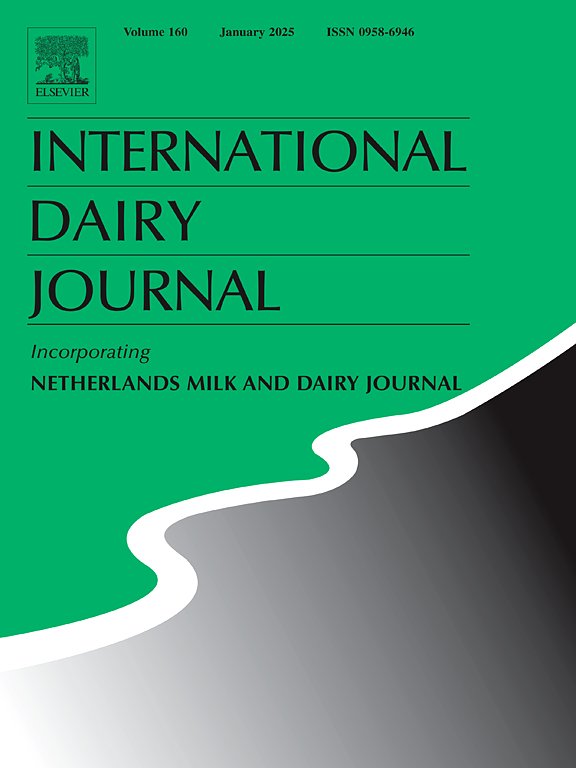Extracellular vesicles carrying significant amounts of microRNAs are present in goat milk powders
IF 3.1
3区 农林科学
Q2 FOOD SCIENCE & TECHNOLOGY
引用次数: 0
Abstract
Milk-derived extracellular vesicles (mEVs) play a crucial role in intercellular communication, mainly via their microRNAs, and could influence consumer health. Little is known about mEVs from goat milk powder (GMP) consumed as an alternative to bovine milk powder. mEVs were isolated from skimmed and whole GMP, using Size Exclusion Chromatography and their microRNA profiles (miRNomes) were established using RNA sequencing. We showed by nanoparticle tracking analysis that GMPs contained between 1.56,109 and 6.63,109 mEVs mL−1 of reconstituted milk, ranging in size from 136.8 to 160.6 nm. Five major milk protein mRNAs were also detected within mEVs. The GMP miRNome was made of 351 microRNAs, sharing 89 % of known microRNAs with previously reported raw goat milk miRNome. Thus, we demonstrated that: i) mEVs of a typical morphology are present in GMPs; ii) mEVs survived the drying process; iii) their microRNA cargo is rather well protected from degradation during this process.
山羊奶粉中存在携带大量 microRNA 的细胞外囊泡
牛奶衍生的细胞外囊泡(mEVs)主要通过其微核糖核酸(microRNAs)在细胞间通信中发挥着重要作用,并可能影响消费者的健康。我们利用尺寸排阻色谱法从脱脂羊奶粉和全脂羊奶粉中分离出了 mEVs,并利用 RNA 测序建立了它们的 microRNA 图谱(miRNomes)。我们通过纳米粒子跟踪分析表明,GMP 含有 1.56,109 至 6.63,109 mEVs mL-1 的重组牛奶,大小从 136.8 纳米到 160.6 纳米不等。在 mEVs 中还检测到了五种主要的牛奶蛋白 mRNA。GMP miRNome 由 351 个 microRNA 组成,与之前报道的生羊奶 miRNome 共享 89% 的已知 microRNA。因此,我们证明了:i) GMP 中存在典型形态的 mEV;ii) mEV 在干燥过程中存活下来;iii) 其 microRNA 货物在此过程中受到很好的保护,不会降解。
本文章由计算机程序翻译,如有差异,请以英文原文为准。
求助全文
约1分钟内获得全文
求助全文
来源期刊

International Dairy Journal
工程技术-食品科技
CiteScore
6.50
自引率
9.70%
发文量
200
审稿时长
49 days
期刊介绍:
The International Dairy Journal publishes significant advancements in dairy science and technology in the form of research articles and critical reviews that are of relevance to the broader international dairy community. Within this scope, research on the science and technology of milk and dairy products and the nutritional and health aspects of dairy foods are included; the journal pays particular attention to applied research and its interface with the dairy industry.
The journal''s coverage includes the following, where directly applicable to dairy science and technology:
• Chemistry and physico-chemical properties of milk constituents
• Microbiology, food safety, enzymology, biotechnology
• Processing and engineering
• Emulsion science, food structure, and texture
• Raw material quality and effect on relevant products
• Flavour and off-flavour development
• Technological functionality and applications of dairy ingredients
• Sensory and consumer sciences
• Nutrition and substantiation of human health implications of milk components or dairy products
International Dairy Journal does not publish papers related to milk production, animal health and other aspects of on-farm milk production unless there is a clear relationship to dairy technology, human health or final product quality.
 求助内容:
求助内容: 应助结果提醒方式:
应助结果提醒方式:


